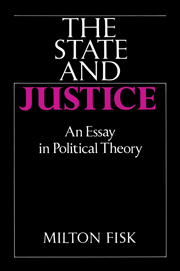Book contents
- Frontmatter
- Contents
- Preface
- Introduction: Can the state rule without justice?
- Part One An outline of a materialist political theory
- Part Two An assessment of the place of justice in the state
- 5 Ideal justice
- 6 Property and justice
- 7 Repression and radical justice
- 8 Justice and materialism
- 9 Equality and liberty
- 10 Class and the limits of control
- Part Three A functional view of political institutions
- Part Four An account of the community of states
- Part Five A reflection on the transition to a new kind of state
- Conclusion: State, class, and democracy
- Notes
- Index
8 - Justice and materialism
Published online by Cambridge University Press: 06 July 2010
- Frontmatter
- Contents
- Preface
- Introduction: Can the state rule without justice?
- Part One An outline of a materialist political theory
- Part Two An assessment of the place of justice in the state
- 5 Ideal justice
- 6 Property and justice
- 7 Repression and radical justice
- 8 Justice and materialism
- 9 Equality and liberty
- 10 Class and the limits of control
- Part Three A functional view of political institutions
- Part Four An account of the community of states
- Part Five A reflection on the transition to a new kind of state
- Conclusion: State, class, and democracy
- Notes
- Index
Summary
We may seem to have given away too much in our discussion of state justice. How can state justice liberate people from the worst effects of the economy but at the same time fit within the canons of a materialist political theory? Our account seems to tie the state at one end to the economy, but at the other end, where justice is concerned, the state does not seem restricted by the economy. Don't we have to face a hard choice here? Either we return to the atomist materialism that allows no autonomy to the state, in which case justice as a form of ruling reflects the economy; or we resort to imposing ideal justice on the operation of the state from totally outside the economy. This is a choice that many have felt they could not escape. The framework model, however, allowed us to escape from this choice by supporting a contextual materialism adequate for state justice.
Weak and strong limits
As I have formulated the thesis of state autonomy, it does not imply independence from the economy. It is the rather different thesis that the form and the function of the state may be in conflict. This conflict is quite compatible with the view that not only the function but also the form of ruling are derived from the economy, in a sense of derivation that fits with the idea of structure cause in the framework model.
- Type
- Chapter
- Information
- The State and JusticeAn Essay in Political Theory, pp. 104 - 114Publisher: Cambridge University PressPrint publication year: 1989



